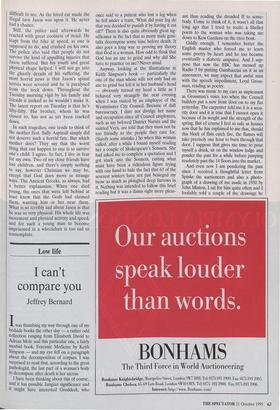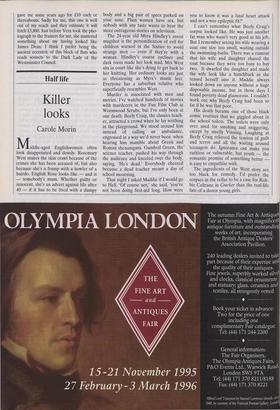Low life
I can't compare you
Jeffrey Bernard
Iwas thumbing my way through one of my bedside books the other day — a rather odd collection ranging from Elizabeth David to Adrian Mole and this particular one, a fairly morbid book, Forensic Medicine by Keith Simpson — and my eye fell on a paragraph about the decomposition of corpses. I was surprised to read that, according to the great pathologist, the last part of a woman's body to decompose after death is her uterus.
I have been thinking about this of course, and it has possible Jungian significance and it might have interested Groddeck, who once said to a patient who lost a leg when he fell under a tram, 'What did your leg do that you decided to punish it by having it cut off?' There is also quite obviously great sig- nificance in the fact that so many male geni- talia decompose some time before death. It also goes a long way to proving my theory that God is a woman. How odd to think that God has an axe to grind and why did She have to practice on me? Never mind. Anyway, looking at the illustrations in Keith Simpson's book — particularly the one of the man whose wife not only had an axe to grind but left it in her husband's head — obviously turned my head a little as I behaved very strangely the next evening when I was visited by an employee of the Westminster City Council. Because of daft bureaucracy, I dare not divulge her name and occupation since all Council employees, such as my beloved District Nurses and the sainted Vera, are told that they must not be too friendly to the people they care for. (Surely some mistake.) So when this woman called, after a while I found myself reading her a couple of Shakespeare's Sonnets. She had asked me to complete a quotation and I got stuck into the Sonnets, cutting what must have been a ridiculous figure trying with one hand to hide the fact that 63 of the severest winters have not just besieged my brow so much as ploughed deep furrows in it. Nothing was intended to follow this brief reading but it was a damn sight more pleas- ant than reading the dreaded If to some- body. Come to think of it, it wasn't all that long ago that I tried to recite a Shelley poem to the woman who was taking me down to Kew Gardens on the river boat.
Oddly enough, I remember better the English master who forced me to learn some poetry by heart and he too became eventually a diabetic amputee. And I sup- pose that now the BBC has messed up Radio 3 by putting Gambaccini on it as an announcer, we may expect that awful man with the speech impediment, Loyd Gross- man, reading us poetry.
There was music to my ears as unpleasant as Grossman's voice too when the Council builders put a new front door on to my flat yesterday. The carpenter told me it is a secu- rity door and it is true that I cannot open it because of its weight and the strength of the spring. But of course I feel as safe as houses now that he has explained to me that, should this block of flats catch fire, the flames will take precisely one hour to burn through that door. I suppose that gives me time to pour myself a drink, sit on the window ledge and ponder the past for a while before jumping resolutely past the 14 floors into the market.
And even now I am pondering the past since I received a thoughtful letter from Spinks the auctioneers and also a photo- graph of a drawing of me made in 1950 by John Minton. I sat for him quite often and I foolishly sold a couple of the drawings he gave me some years ago for £10 each or thereabouts. Sadly for me, this one is well out of my reach and they estimate it will fetch £3,800. Just before Vera took the pho- tograph to the framers for me, she muttered something about my having looked like James Dean. I think I prefer being the ancient eccentric of this block of flats who reads sonnets to the Dark Lady of the Westminster Council.











































































 Previous page
Previous page